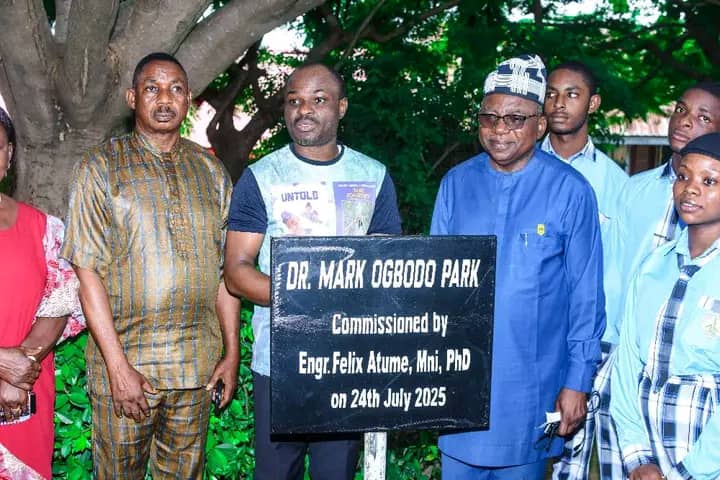NEWS
Mbah Signs into Law Bill to Create One-stop Shop for Taxation in Enugu

From Sylvia Udegbunam, Enugu
Enugu State Governor, Peter Mbah has signed into law the bill to create a one-stop shop for tax collection and administration in Enugu State, thereby ending multiple taxation.Titled, The Enugu State Internal Revenue Service (Establishment and Consolidation of Revenue Administration) Law, 2025, the new legislation also makes the revenue collection agency autonomous and free of bureaucratic encumbrances.
Speaking at the short bill signing ceremony at Government House, Enugu, on Tuesday, Mbah described the law as a milestone in his administration’s quest to enable the Ease of Doing business and make the state the premier destination for investment. “I recall several times that I have engaged the business community, the organised private sector, and the market women. They have always complained about multiple taxation. People coming from everywhere with different types of government receipts to ask them to pay tax. That will end today.“With the signing of this bill into law, we now have one revenue collection point, whether for the market women, the organised private sector, and the different agencies of government. You would have one clear point where to pay your tax and you will be issued with the appropriate receipt of payment. That means you no longer have any other person coming for the collection of tax.“It is very important because one of the core indicators of the Ease of Doing Business is to make sure that you have the ease of payment of your taxes and you do not have multiple channels where you are being dragged to pay taxes.”According to the governor, the new law would effectively consolidate the revenues of the state and local governments, with each tier of government getting what is due to it at the end of the day such as is obtainable in land charges and Value Added Tax, VAT.“The idea is that you have one point of collection, but the split is also done to the different tiers of government that this revenue is essentially due to.“It is also important that we make this point very clear that this idea of the State Internal Revenue Service collecting on behalf of the other tiers of government is nothing new. As some of you already know, the Land Use Charge is paid to the local government, but collected by the state. So, what we are doing now is essentially consolidate all the other revenue types to ensure that there is one point of collection. So, this is a major milestone and it would also help us have a full line of sight to all the revenues we have in the state,” he stated.He further explained that the Enugu State Inland Revenue Service would henceforth become autonomous.“The Enugu State Inland Revenue Service is now able to act as an autonomous institution of the state government. It also means that they can now set targets and try to meet those targets the same way you run a business. It means that they now have the powers to hire and fire their employees. So, we are increasingly making the Revenue Service a professional body,” he added.Mbah took the opportunity to explain that contrary to some misinformation, the massive rise in the state’s IGR was inspired by widening the tax net, plugging revenue leakages, and deployment of technology, rather than increasing tax rate.“Let me be clear, we have not increased any tax in Enugu State. What we have essentially done and which is impacting our revenue growth is expansion of the tax net. We have also made sure that monies that were collected in cash before now are now adequately captured and paid into the state coffers,” Mbah said.He commended the Enugu State House of Assembly for their support every step of the way, noting with gratitude the expeditiousness with which they treat executive bills.Earlier in his remark, the Speaker of the Enugu State House of Assembly, Hon. Uchenna Ugwu, described the bill as a turning point in revenue collection in the state.“One, it is going to improve the Ease of Doing Business. It is also going to improve the IGR of the state and also block all the loopholes in revenue collection and administration. It is a very good gift to the people of Enugu State,” he said.NEWS
Unique Secondary School Expands Outreach, Honors Ogbodo, Launches Scholarships

By David Torough, Abuja
Unique Secondary School Makurdi (USSM), a leading private educational institution in Benue State, continues to make significant strides in academic excellence and community impact.
In a bold move to increase accessibility and reward excellence, the school has unveiled a new examination centre in Oju Local Government Area, launched a scholarship scheme for families with multiple children in the school, and honoured a distinguished alumnus, Dr.
Mark Ogbodo, by naming a recreational facility after him.The newly inaugurated Dr. Mark Ogbodo Park was officially commissioned on July 24, during a colourful ceremony held at the school’s New GRA campus in Makurdi.
The event drew an impressive turnout of students, staff, parents, alumni, and dignitaries.
Chairman of Unique Schools and co-founder of USSM, Engr. Felix Atume led the commissioning, describing it as a tribute to dedication and impact.
Dr. Ogbodo, an author and founder of Lydia Memorial Hospital, Ugbokolo, was visibly moved by the honour.
In a social media post after the event, he wrote: “Who am I to deserve this great honour? What impact have I made on USSM? These thoughts flooded my mind as I stood speechless in awe.”
He praised the school leadership, particularly Principal Mr. Samuel Ortsega, and the Parent-Teacher Association (PTA) for the recognition.
Also unveiled at the event was a scholarship programme aimed at easing the financial burden on families with more than one child enrolled at USSM.
The initiative was met with excitement and gratitude from parents in attendance. Furthermore, the newly established Oju exam centre was widely applauded for eliminating the long travel often required for external examinations, especially for students living in remote areas.
Founded on September 1, 1998, by Engr. Atume and Mrs. Juliana Atume, a noted philanthropist, USSM has built a strong reputation for nurturing students through academic rigor and character development.
Originally a day school, it added a boarding facility in 2007 to cater to growing demand. Situated in a serene environment, the school provides a secure and conducive atmosphere for learning.
USSM is part of the larger Unique Schools family, which began with Unique Nursery and Primary School in 1995.
The secondary arm offers a comprehensive curriculum infused with entrepreneurial and vocational training in areas such as catering, fashion, cosmetology, and design—preparing students with practical skills for life beyond the classroom.
The school boasts modern infrastructure, including science laboratories, an ICT centre, a digital library, spacious classrooms, quality boarding facilities, a healthcare unit, and the expansive Engr. Felix Atume Hall. Recreational amenities include courts for basketball, volleyball, tennis, a football pitch, and indoor games like chess and scrabble.
In keeping with global trends, USSM has embraced digital innovations such as an online result-checking system and is planning an enhanced presence on social media.
The school runs a three-term calendar and prepares students for key national examinations including BECE, WAEC, and NECO.
Ambitious plans are underway to launch Unique Technical College, which will focus on technical and vocational education.
As the evening of July 24 transitioned into a celebratory dinner in honour of the 2025 graduating class, guests—including PTA members, parents, alumni, and staff—shared heartfelt goodwill messages. The PTA Chairman described the event as “unparalleled in the school’s history.”
Through initiatives like the Oju centre, new scholarships, and the celebration of alumni impact, Unique Secondary School Makurdi continues to set the benchmark for holistic and community-rooted education in Benue State.
Foreign News
Zelensky Announces New Draft Law on Anti-corruption Bodies after Protests

Ukrainian President Volodymyr Zelensky said he has approved the text of a draft law guaranteeing the freedom of two anti-corruption bodies in Ukraine – days after nationwide protests broke out over changes curbing their independence.
Kyiv’s Western partners had also expressed serious concerns over the legislation.
On Thursday, Zelensky seemed to backtrack, saying the new bill was intended to safeguard the independence of Ukraine’s National Anti-Corruption Bureau (Nabu) and Specialised Anti-Corruption Prosecutor’s Office (Sap), and to protect them from Russian influence.
He said the text of the bill was “balanced”, but did not provide any details.
The law passed earlier this week brought Nabu and Sap under the control of the prosecutor general, who is appointed by the president.
At the time Zelensky justified his decision to curtail the bodies’ powers by citing Russian influence. The day before, Ukraine’s security services had carried out searches and arrests targeting alleged Russian spies at the agency.
The passing of the legislation instantly sparked the largest protests since the start of Russia’s full-scale invasion in February 2022 in several cities across Ukraine, with many worrying the law would severely undermine the Nabu and Sap’s authority and effectiveness.
Thousands of people gathered in streets and squares across Ukraine, holding placards calling for the legislation to be vetoed.
Several commentators accused Zelensky of democratic backsliding. Their concerns were further exacerbated when Ukraine’s Western partners signalled their displeasure with the bill.
Ukraine has official EU candidate status and a spokesman for European Commission chief Ursula von der Leyen previously warned Kyiv that the rule of law and the fight against corruption were “core elements” of membership to the bloc.
On Thursday, the Commission said it “welcomed” the Ukrainian government’s decision to take action against the bill.
“We are working [with the Ukrainian government] to make sure that our concerns… are indeed taken into account,” the spokesman said.
Nabu and Sap were created in 2014-15 as one of the requirements set by the European Commission and International Monetary Fund to move towards a relaxation of visa restrictions between Ukraine and the EU.
Writing on Facebook, opposition MP Oleksiy Goncharenko noted Zelensky said that “the independence of anti-corruption institutions must be guaranteed.”
“First we take it away, and then we say that it must be guaranteed. So why was all this necessary?”
In his message on social media on Thursday, Zelensky did not acknowledge the protests or the backlash but said it was “important that we respect the position of all Ukrainians and are grateful to everyone who stands with Ukraine.”
NEWS
Why I Quit Banking for Music – CDQ

Nigerian rapper CDQ has revealed that he left a stable banking job to pursue his true passion, music.
In an interview, the hip-hop star shared that becoming a banker was a move to honor his late father’s wishes, but it wasn’t where his heart truly belonged.
“I quit my bank job.
I couldn’t tell my mother or any family member then. I left the house and went to stay with Masterkraft in the studio,” he said.CDQ admitted that while at the bank, he often found himself scribbling lyrics during work hours instead of focusing on his official duties.
The internal conflict eventually led him to a bold decision, quitting his job to chase a career in music.
According to him, even his close friend and producer, Masterkraft, was shocked when he learned about the decision. Interestingly, Masterkraft used to lend CDQ suits to wear to the bank.
“I told him banking isn’t my passion. I will probably just do it to make ends meet. But music is something that, whether it gives me a return or not, I’m still happy doing it,” CDQ added.
CDQ’s gamble paid off. He shot to fame in 2016 with his hit single “Indomie” featuring Masterkraft and Olamide.



















